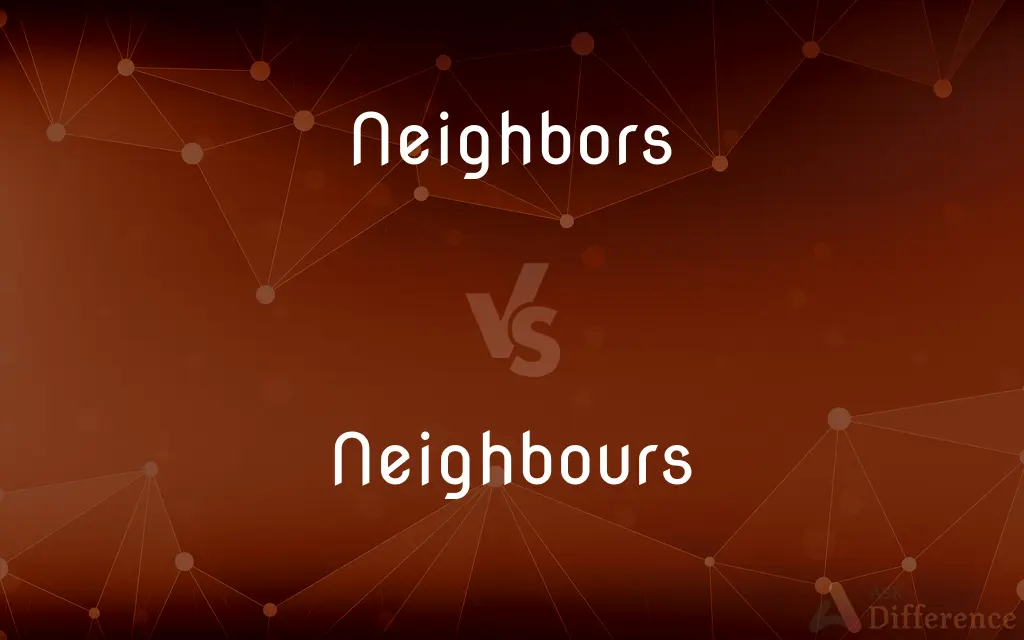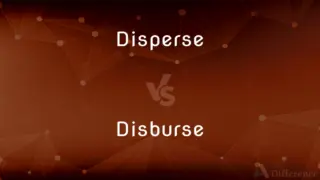Neighbors vs. Neighbours — What's the Difference?
By Fiza Rafique & Maham Liaqat — Updated on April 25, 2024
"Neighbors" is the American English spelling for the people living nearby, while "neighbours" follows British English conventions.

Difference Between Neighbors and Neighbours
Table of Contents
ADVERTISEMENT
Key Differences
"Neighbors" is the preferred spelling in American English, used in contexts like local community interactions. On the other hand, "neighbours" is used in the same contexts within British English-speaking regions.
In American English, "neighbors" appears in literature, signage, and media, emphasizing a simplified spelling tradition. Whereas in British English, "neighbours" retains more traditional spelling which often includes additional letters.
Usage of "neighbors" reflects American English's tendency to simplify and modify spellings from their British origins, while "neighbours" preserves the original form seen in older versions of the language.
The spelling "neighbors" is commonly taught in American schools and used in government documents, while "neighbours" follows suit in countries like the UK, Canada, and Australia.
While software and online platforms often default to "neighbors" in American settings, they switch to "neighbours" based on the language settings related to British English.
ADVERTISEMENT
Comparison Chart
Spelling Tradition
Simplified
Traditional
Regional Usage
United States
UK, Canada, Australia
Educational Standards
Taught in American schools
Taught in British schools
Media Representation
Media in USA
Media in UK and Commonwealth
Language Settings Impact
Defaults to American English
Defaults to British English
Compare with Definitions
Neighbors
The closest nations geographically or politically.
Canada and Mexico are neighbors of the USA.
Neighbours
Those residing close to one another in British communities.
Her neighbours help out during the holidays.
Neighbors
Members of the local residential community.
The neighbors signed a petition.
Neighbours
Adjacent countries in a British context.
France and Germany are neighbours.
Neighbors
A person living near or next door.
She borrowed sugar from her neighbors.
Neighbours
A person living in proximity in the UK.
He greeted his new neighbours with a cake.
Neighbors
Those who are geographically close.
Our neighbors often have barbecues.
Neighbours
Members of a neighbourhood in Britain.
The neighbours formed a local watch group.
Neighbors
Immediate occupants of an adjacent area.
The noisy neighbors kept us awake.
Neighbours
Occupants nearby in a British setting.
Our neighbours at the hotel were quite polite.
Neighbors
One who lives near or next to another.
Neighbours
Neighbours is an Australian television soap opera that was first broadcast on the Seven Network on 18 March 1985. It was created by television executive Reg Watson.
Neighbors
A person, place, or thing adjacent to or located near another.
Neighbours
Variant of neighbor.
Neighbors
A fellow human.
Neighbours
Plural of neighbour
Neighbors
Used as a form of familiar address.
Neighbors
To lie close to or border directly on.
Neighbors
To live or be situated close by.
Neighbors
Situated or living near another
A neighbor state.
Neighbors
Plural of neighbor
Common Curiosities
Can 'neighbors' and 'neighbours' be used interchangeably?
They can be interchangeable in meaning but are region-specific in use due to spelling differences.
What impact does the spelling variation have on language learning?
Learners must be aware of the regional variations to ensure proper usage in different English-speaking contexts, which can affect spelling and word recognition skills.
Do English language tests differentiate between 'neighbors' and 'neighbours'?
English language proficiency tests like TOEFL and IELTS accept both spellings, but test takers are encouraged to consistently use one form based on the variant of English they are being tested on.
Why does American English use 'neighbors'?
American English often simplifies spellings from the traditional British forms.
How does media in the US and UK differ in using 'neighbors' vs. 'neighbours'?
In the US, media outlets use "neighbors" in accordance with American English spelling conventions, while UK media uses "neighbours" following British English standards.
Is one spelling more correct than the other in international English?
Neither spelling is more correct; the choice between "neighbors" and "neighbours" depends on the regional or dialectical preference of the English being used.
Can using the wrong variant of 'neighbors/neighbours' affect communication?
While using one variant over the other generally does not impede understanding among English speakers, it may signal the user's regional linguistic background or influence the formal correctness in specific academic or professional settings.
What is the main difference between 'neighbors' and 'neighbours'?
The main difference is in the spelling; "neighbors" is American English, while "neighbours" is British English.
Are there contexts where 'neighbors' is preferred globally?
In international contexts, American English spelling might be used, especially in technical or global business settings.
How does the spelling influence educational materials in respective regions?
Educational materials reflect regional spellings; American materials use "neighbors," while British materials use "neighbours".
Share Your Discovery

Previous Comparison
Chilly vs. Cold
Next Comparison
Disperse vs. DisburseAuthor Spotlight
Written by
Fiza RafiqueFiza Rafique is a skilled content writer at AskDifference.com, where she meticulously refines and enhances written pieces. Drawing from her vast editorial expertise, Fiza ensures clarity, accuracy, and precision in every article. Passionate about language, she continually seeks to elevate the quality of content for readers worldwide.
Co-written by
Maham Liaqat















































